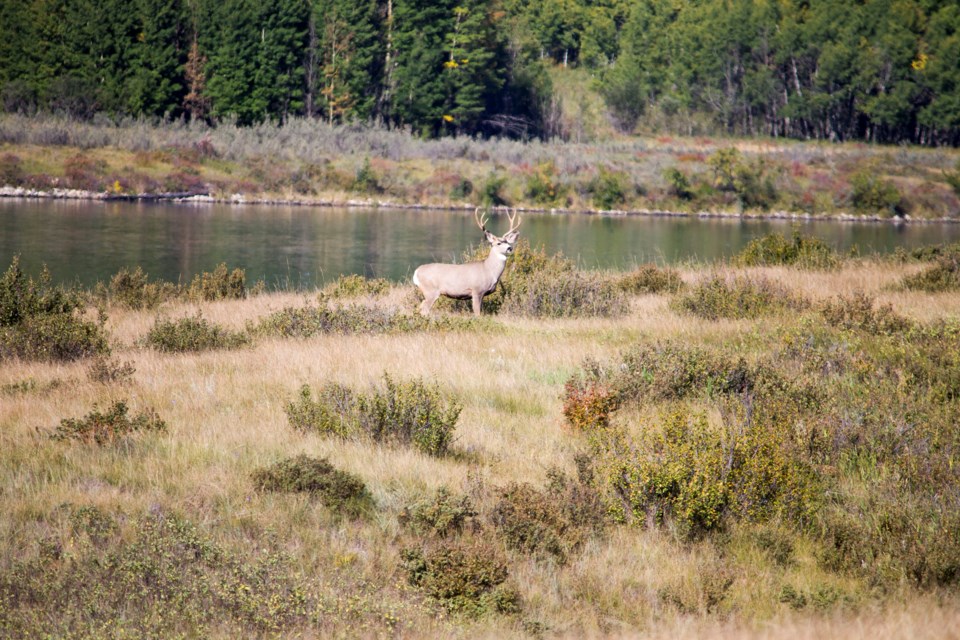Participants at a talk at the Haskayne Legacy Park Wednesday evening who were hoping to get some good news from Jeromy Farkas on the fate of a controversial dam were disappointed to hear his update consisted of an apology for a broken promise.
Farkas had sent out an invitation to a Parks Canada talk on aquatic invasive species, with an addendum promising an update from him on the Glenbow East Dam project being considered by the provincial government.
Farkas, the CEO of the Glenbow Ranch Park Foundation (GRPF), has been spearheading the fight against the Glenbow East Dam option. Not only would the dam destroy the Haskayne Legacy Park (which has only been open for less than a year), but the Glenbow Ranch Provincial Park would suffer irreparable damage, the Town of Cochrane would be susceptible to extensive infrastructure damage, some homes would be sacrificed, and the CP rail line would have to be relocated at substantial cost and environmental disruption.
In addition to all those factors, Farkas said perhaps the most glaring issue surrounding the proposed dam is how it would represent such a high profile broken promise from a government that assured the Haskaynes and the Harvie family (who’s donations enabled the creation of the Glenbow Ranch Park Foundation) that the parks would be protected in perpetuity.
Philanthropists Dick and Lois Haskayne donated the land for the Haskayne Legacy Park, valued at $5 million, and added $2 million towards the construction of the pavilion. The ribbon-cutting was nine months ago.
“We need a solution that honours the incredible promise that wasn’t just made to the Harvies or the Haskaynes, but the promise that was made to all of us as Albertans, that these incredible lands would be kept forever, in perpetuity for all of us to enjoy,” he said.
As word spreads beyond Alberta’s borders that the province is considering reneging on a promise to protect the two parks as part of a deal that attracted millions of dollars in donations, Farkas said it would have a serious chilling effect on anyone considering donating land and/or funding to other jurisdictions to create protected areas.
Somewhat ironically, the meeting took place in the new pavilion building at Haskayne Legacy Park, which would be a casualty of the Glenbow East Dam project should Alberta Environment and Protected Areas (AEPA) decide to go ahead and build the much-maligned proposed dam across the Bow River east of Cochrane.
“When you’re in a room like this, knowing that the park isn’t even nine months old, the fact that the dam would run straight through this building at ground zero, I still find that absolutely . . . I have no words for it, and I’ve seen a lot in my time in politics,” he said.
Farkas apologized to the crowd for not yet making public the answers to a series of questions the Foundation posed to the province coming out of a May 27 townhall meeting in Bearspaw, which was sponsored by the GRPF. At that meeting, a group of project managers and a public engagement specialist from AEPA refused to answer questions from the crowd, so Farkas promised to take down their questions, submit them to Alberta Environment, and then distribute the answers publicly.
So his apology was to the crowd on Wednesday, for not doing so as of yet. He still hasn’t received any response from AEPA.
“Unfortunately it’s been more than 60 days without a response from government,” he said. “So it’s out of my control but I still feel accountability and responsibility for this. I do apologize.”
If the Glenbow East Dam option were built, about a third of Glenbow Ranch park would be flooded, including historic grasslands that contribute to overall watershed health.
In 2018, the Alberta government initiated the Bow River Reservoir Options (BRRO) project to explore reservoir options located at Morley, Relocated Ghost Dam and Glenbow East. At a townhall meeting in Bearspaw May 29 a project director from the province confirmed the Morley option had been abandoned. No reason has been given.
As part of the ongoing BRRO, officials from Alberta Environment and Protected Areas (AEPA) have been exploring options to mitigate flood damage and address drought conditions for about five years, in the wake of the 2013 flood in southern Alberta. They have promised a decision on the next phase of investigations would be made by this fall.




